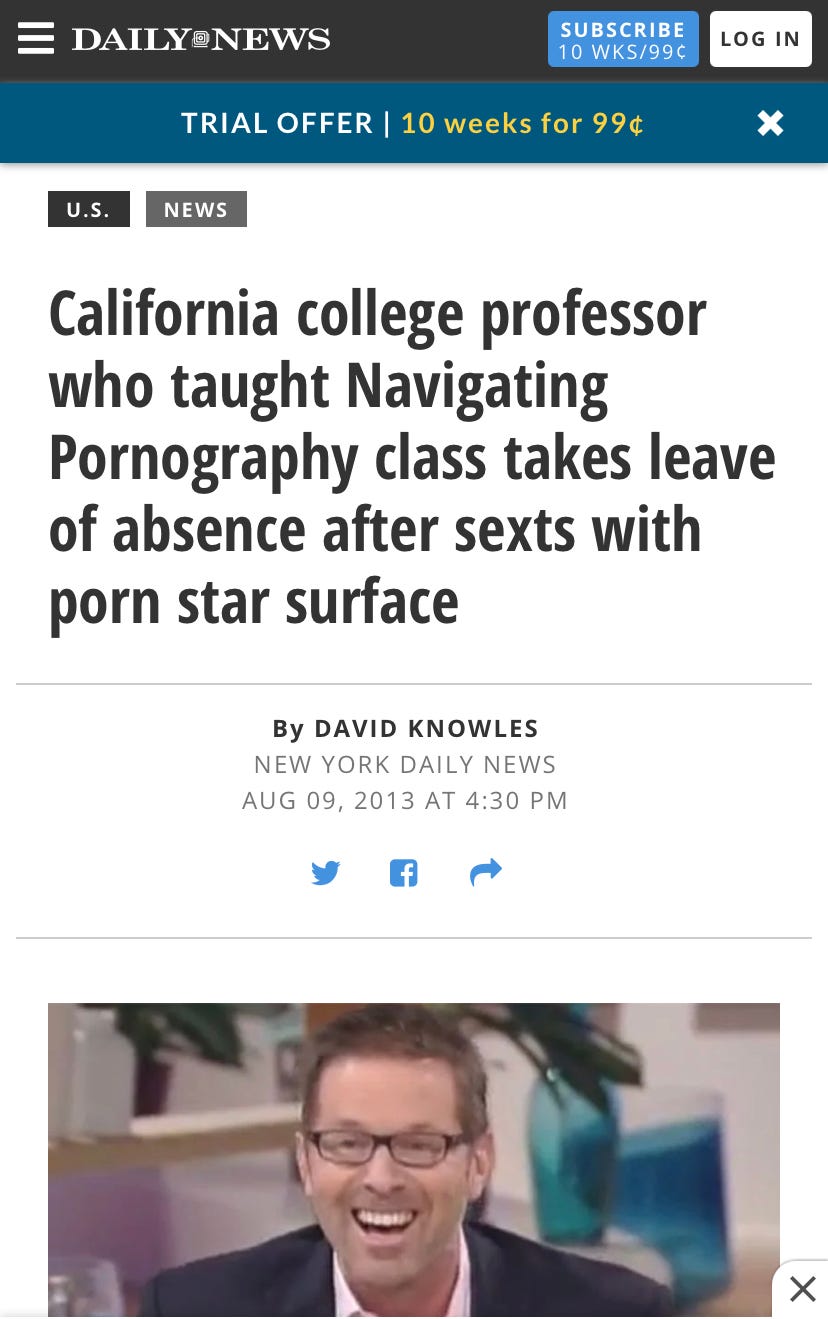This is a public post. If you subscribe, however, you’ll be getting 2-3 additional posts from me per week. I’d be very grateful for your support!
Last week, former Congresswoman Katie Hill lost her court case against the Daily Mail. A Los Angeles County Superior Court judge ordered Hill to pay $105,000 in court costs to the Mail’s parent company.
As you may recall, Hill resigned from Congress less than a year into her freshman term, after the revelation of an affair with a staffer. Hill was a victim of revenge porn by her ex-husband, who released nude pics of Hill with that female staffer to the media. Though they felt sympathy for the abuse she suffered from her husband, the prigs and prudes on the left were adamant she had to go; to the woke, sexual relationships with subordinates must lead invariably to the professional death penalty. Despite pleas from party moderates to stay, Hill could not resist the overwhelming pressure from the left to resign. (The seat is now held by a pro-Trump Republican, but hey, morality over politics, amirite?)
The Daily Mail (and a conservative blog) both printed the nude photos of Hill with her lover, blurring out private parts but leaving little else to the imagination. Hill sued – the photos had been released without her permission, and they were calculated to cause humiliation. It was surely as obvious a case of revenge porn as anyone could ask to see.
As the Los Angeles Times explained, California has a revenge porn law – but it has a “public interest” exemption, one that allows for reproduction of illicitly-obtained intimate photographs if the publisher can demonstrate that they are newsworthy. The Mail argued successfully that because the photos proved that Hill was having an affair with a subordinate, the pictures had a direct bearing on the public’s assessment of the Congresswoman’s fitness for office.
Robin Abcarian, generally a reliable feminist voice in the LA Times opinion pages, has little sympathy for Hill:
She was an inexperienced politician, yes, but she had run a homeless services agency and surely knew the ethical and legal perils facing a boss who sleeps with a subordinate, especially a much younger one, as was the case with Hill and her staffer, who was in her mid-20s at the time. So, while the revenge porn law is a much-needed corrective to the privacy abuses of our digital age, there are situations where, painful as it may be, it simply cannot apply.
Emphasis mine.
For many feminists, the Hill case creates a dilemma. There’s an instinctive desire to protect women from the horrors of revenge porn, and an equally intense impulse to hold public figures accountable for their sexual misconduct. Abcarian’s editorial makes it clear which of these two motivations is stronger in contemporary feminism: it is more important to punish those who sleep with their subordinates than it is to ensure women’s right to keep their intimate lives private.
An understandably anguished Hill has vowed to appeal, but most legal experts give her very little chance of prevailing.
There’s a long history of a greater tolerance for mocking, or otherwise exposing, public figures. (Think of Oscar Wilde.) The judge in Katie Hill’s case was aware not only of the public interest exemption in California’s revenge porn law, but also of the famous SCOTUS decision in Hustler Magazine vs. Falwell.Televangelist Jerry Falwell had sued Hustler after the porn magazine had published a satirical ad claiming that Falwell had lost his virginity to his mother in the family outhouse. Falwell won in the lower courts, but lost before the Supremes, who declared emphatically that public figures did not enjoy the same protections against libel, slander, and cruel satire as others did.
(If the long-rumored “pee tape” of Donald Trump and Russian sex workers ever sees the light of day, I’m quite confident my friends on the left would want that published – and its publication would be protected by the Hustler case.)
I’ve been where Katie Hill is. In late 2012 and early 2013, I had a sexting affair with a young woman. We never met in person, but exchanged videos and photos as well as intimate chat. This young woman had a boyfriend, and a jealous one at that. When he went through his partner’s phone and discovered the videos, images, and texts, he sent me screenshots, attempting to blackmail me. I was terrified, but I also knew better than to plead or negotiate. I told him to do his worst, and he did.
In August 2013, a porn industry website published screenshots of the sexts, and an excerpt of a video of me masturbating in the restroom of the Delta SkyClub at JFK airport. (I won’t link to the site, which is still up, but here’s a safe New York Daily News story on the subject.) It was intensely humiliating. The woman I’d sexted with broke up with that boyfriend, but was far too frightened to try any legal action.
I was already in the midst of a complete mental collapse by the time the sexts appeared. I was filled with suicidal self-loathing, and the disgust that so many had at the publication of these horribly embarrassing sexts just fueled my own despair. Even through the haze of my self-hatred and shame, however, I knew damn well that I had no legal case against the porn site that had published the evidence of my indiscretions. I was a public figure who had built a reputation as a happily married male feminist – the proof that I was something other than what I pretended to be was by legal definition both newsworthy and protected by the First Amendment.
Was it necessary that an image of me masturbating be included? Probably not – but the courts, as they just did in the Hill case, have long given great leeway to publishers who can prove that a salacious (if true) story is in the public interest. The website is still up, and somehow, someday, my children will find it. The consequences of my recklessness will follow me and my children for years to come.
What is the line between the public’s right to know about the imperfections of their leaders, and the right of even the most public of figures to maintain a semblance of privacy? In an era where a prurient and puritanical public regards hypocrisy as the greatest sin of all, and in a world where the hunger for “accountability” justifies every cruelty, one thing is certain: there will be many more Hugo Schwyzers and Katie Hills.
Video of the day:
This past weekend, Joan Baez was among the recipients of the Kennedy Center Honors. Country legends Emmylou Harris and Mary Chapin Carpenter sang a medley of three iconic Joan songs, and it was sublime indeed. If you watch the video, you’ll see that fellow honoree Dick Van Dyke knows the lyrics to “Diamonds and Rust,” and you’ll even catch Senator Joe Manchin singing along to “We Shall Overcome.”




